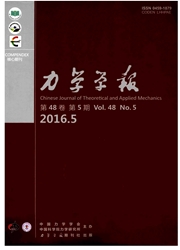

 中文摘要:
中文摘要:
为了研究Taylor补丁对新型(S型)动脉旁路移植术中吻合口处流场的影响,使用数值方法研究了采用Taylor补丁和未采用该补丁的两个S型旁路移植模型内流场的血流动力学差异.对流速、壁面切应力和切应力梯度等参数进行了比较分析.结果表明,Taylor补丁对吻合口的流场有显著影响.采用Taylor补丁的模型其下游吻合口处的流场分布较未采用补丁的模型更均匀,二次流平均流速减小约34.48%,壁面切应力梯度减小约52.22%,从壁面切应力梯度方面分析,这将有助于改善血流动力学分布,抑制动脉粥样硬化.但从壁面切应力值分析,其动脉底部的壁面低切应力区明显增大,平均壁面切应力值减小30.33%,这又将促使动脉粥样硬化.因此,Taylor补丁是否对S型搭桥术具有治疗优越性,仅从血流动力学分析尚不能定论,配合数值计算结果进行动物和临床实验研究是十分必要的.
 英文摘要:
英文摘要:
In order to clarify the influence of Taylor patch on the flow field in a new (S-type) arterial end-to-side anastomosis, a numerical investigation was carried out in terms of the flow patterns, wall shear stresses, and wall shear stresses gradients. The numerical results showed that the Taylor patch had an great effect on the flow field at the distal anastomosis. At the distal anastomosis, more smooth distributions of flow patterns were obtained, and the second flow and the wall shear stress gradients decreased almost 34.48% and 52.22%, respectively, to improve the haemodynamics, while at the artery bottom the wall shear stress was reduced about 30.33% to promote atherosclerosis. Therefore, it can not be concluded that the Taylor patch has superior treatment in S-type bypass graft by only considering haemodynamic factors. Moreover, a lot of animal and clinical experiments are needed to be carried out with numerical study.
 同期刊论文项目
同期刊论文项目
 同项目期刊论文
同项目期刊论文
 Characterization of an Endovascular Prosthesis Using the 3Bs Rule (Biocompatibility, Biofunctionalit
Characterization of an Endovascular Prosthesis Using the 3Bs Rule (Biocompatibility, Biofunctionalit Swirling flow created in a glass tube suppressed platelet adhesion to the surface of the tube: Its i
Swirling flow created in a glass tube suppressed platelet adhesion to the surface of the tube: Its i Concentration Polarization of Oxidative Modification of Low-Density Lipoproteins: Its Effect on Oxid
Concentration Polarization of Oxidative Modification of Low-Density Lipoproteins: Its Effect on Oxid 3,30-Dioctadecylindocarbocyanine-low-density lipoprotein uptake and flow patterns in the rabbit aort
3,30-Dioctadecylindocarbocyanine-low-density lipoprotein uptake and flow patterns in the rabbit aort Analysis of Sixty-Two Explanted Liotta Bioprostheses: Biocompatibility, Biofunctionality, And Biodur
Analysis of Sixty-Two Explanted Liotta Bioprostheses: Biocompatibility, Biofunctionality, And Biodur Clinical Device-Related Article Pivoting System Fracture in a Bileaflet Mechanical Valve: A Case Rep
Clinical Device-Related Article Pivoting System Fracture in a Bileaflet Mechanical Valve: A Case Rep 期刊信息
期刊信息
